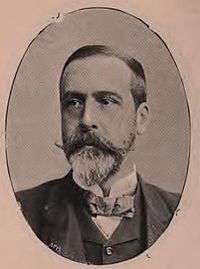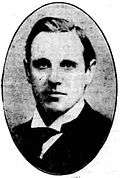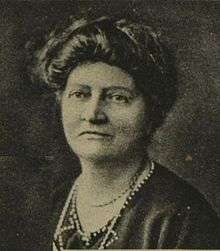Warrington (UK Parliament constituency)
| Warrington | |
|---|---|
|
Former Borough constituency for the House of Commons | |
| 1832–1983 | |
| Number of members | One |
| Replaced by | Warrington North and Warrington South |
| Created from | Lancashire |
Warrington was a parliamentary constituency in the United Kingdom. From 1832 to 1983 it returned one Member of Parliament (MP) to the House of Commons of the Parliament of the United Kingdom.
History
The Warrington constituency covered the central part of the town of Warrington in Lancashire and surrounding area.
In 1983 it was abolished and replaced by Warrington North and Warrington South constituencies.
Boundaries
The Parliamentary Borough of Warrington was defined by the Parliamentary Boundaries Act 1832 as comprising:
The respective Townships of Warrington and Latchford; and also those two detached portions of the township of Thelwall which lie between the boundary of the township of Latchford and the River Mersey[1][2]
It was this area that was incorporated as a Municipal Borough in 1847.[3] The boundaries were unchanged until 1918 when the constituency was redefined as being identical with the area of the County Borough of Warrington.[4] The constituency boundaries were widened to reflect those of the County Borough in 1950, at the same time it was renamed as Warrington Borough Constituency.[5][6]
Members of Parliament
Election results
Elections in the 1880s
| Party | Candidate | Votes | % | ± | |
|---|---|---|---|---|---|
| Conservative | Sir Gilbert Greenall | 4,010 | |||
| Liberal | William Crosfield | 3,234 | |||
| Majority | 776 | ||||
| Turnout | |||||
| Conservative hold | Swing | ||||
| Party | Candidate | Votes | % | ± | |
|---|---|---|---|---|---|
| Conservative | Sir Gilbert Greenall | 3,717 | |||
| Liberal | John Crosfield | 3,216 | |||
| Majority | 501 | ||||
| Turnout | |||||
| Conservative hold | Swing | ||||
Elections in the 1890s

| Party | Candidate | Votes | % | ± | |
|---|---|---|---|---|---|
| Conservative | Robert Pierpont | 3,843 | |||
| Liberal | Arthur Houston | 3,258 | |||
| Majority | 585 | ||||
| Turnout | |||||
| Conservative hold | Swing | ||||
| Party | Candidate | Votes | % | ± | |
|---|---|---|---|---|---|
| Conservative | Robert Pierpont | 4,001 | |||
| Liberal | Percival Brown Scott | 3,326 | |||
| Majority | 675 | ||||
| Turnout | |||||
| Conservative hold | Swing | ||||
Elections in the 1900s
| Party | Candidate | Votes | % | ± | |
|---|---|---|---|---|---|
| Conservative | Robert Pierpont | 4,468 | |||
| Liberal | Arthur Henry Crosfield | 3,303 | |||
| Majority | 1,165 | ||||
| Turnout | |||||
| Conservative hold | Swing | ||||

| Party | Candidate | Votes | % | ± | |
|---|---|---|---|---|---|
| Liberal | Arthur Henry Crosfield | 5,599 | |||
| Conservative | Robert Pierpont | 4,099 | |||
| Majority | 1,500 | ||||
| Turnout | |||||
| Liberal gain from Conservative | Swing | ||||
Elections in the 1910s
| Party | Candidate | Votes | % | ± | |
|---|---|---|---|---|---|
| Liberal | Arthur Henry Crosfield | 5,256 | |||
| Conservative | Robert Pierpont | 5,103 | |||
| Majority | |||||
| Turnout | |||||
| Liberal hold | Swing | ||||
.jpg)
| Party | Candidate | Votes | % | ± | |
|---|---|---|---|---|---|
| Conservative | Harold Smith | 5,162 | 51.2 | ||
| Liberal | Arthur Henry Crosfield | 4,916 | 48.8 | ||
| Majority | 2.4 | ||||
| Turnout | |||||
| Conservative gain from Liberal | Swing | ||||
General Election 1914/15:
Another General Election was required to take place before the end of 1915. The political parties had been making preparations for an election to take place and by the July 1914, the following candidates had been selected;
- Unionist: Harold Smith
- Liberal:
Elections in the 1910s
| Party | Candidate | Votes | % | ± | |
|---|---|---|---|---|---|
| Unionist | 10,403 | 43.7 | |||
| Liberal | Sir Peter Peacock | 8,011 | 33.7 | ||
| Labour | Isaac Brassington | 5,377 | 22.6 | n/a | |
| Majority | 2,392 | 10.0 | |||
| Turnout | 70.2 | ||||
| Unionist hold | Swing | ||||
- endorsed by Coalition Government
Elections in the 1920s
| Party | Candidate | Votes | % | ± | |
|---|---|---|---|---|---|
| Unionist | Alec Stratford Cunningham-Reid | 15,394 | 53.1 | +9.4 | |
| Labour | James Gregory | 13,570 | 46.9 | +24.3 | |
| Majority | 1,824 | 6.2 | -3.8 | ||
| Turnout | 84.7 | +14.5 | |||
| Unionist hold | Swing | -7.4 | |||
| Party | Candidate | Votes | % | ± | |
|---|---|---|---|---|---|
| Labour | Charles Dukes | 12,984 | 43.6 | -3.3 | |
| Unionist | Alec Stratford Cunningham-Reid | 12,314 | 41.3 | -11.8 | |
| Liberal | John Francis Crowley | 4511 | 15.1 | n/a | |
| Majority | 670 | 2.3 | 8.9 | ||
| Turnout | 86.1 | +1.4 | |||
| Labour gain from Unionist | Swing | +4.4 | |||
| Party | Candidate | Votes | % | ± | |
|---|---|---|---|---|---|
| Unionist | Alec Stratford Cunningham-Reid | 16,788 | 52.4 | +11.1 | |
| Labour | Charles Dukes | 15,251 | 47.6 | +4.0 | |
| Majority | 1,537 | 4.8 | 7.1 | ||
| Turnout | 91.0 | +4.9 | |||
| Unionist gain from Labour | Swing | +3.5 | |||

| Party | Candidate | Votes | % | ± | |
|---|---|---|---|---|---|
| Labour | Charles Dukes | 21,610 | 50.6 | +3.0 | |
| Unionist | Noel Barre Goldie | 18,025 | 42.2 | -10.2 | |
| Liberal | Alison Vickers Garland | 3,070 | 7.2 | n/a | |
| Majority | 3,585 | 8.4 | 13.2 | ||
| Turnout | 89.3 | -1.7 | |||
| Labour gain from Unionist | Swing | +6.6 | |||
Elections in the 1930s
| Party | Candidate | Votes | % | ± | |
|---|---|---|---|---|---|
| Conservative | Noel Barré Goldie | 24,400 | 56.15 | ||
| Labour | Charles Dukes | 19,055 | 43.85 | ||
| Majority | 5,345 | 12.30 | |||
| Turnout | 72.43 | ||||
| Conservative gain from Labour | Swing | ||||
| Party | Candidate | Votes | % | ± | |
|---|---|---|---|---|---|
| Conservative | Noel Barré Goldie | 21,324 | 50.7 | ||
| Labour | Edward Porter | 20,720 | 49.3 | ||
| Majority | 604 | 1.4 | |||
| Turnout | 84.8 | ||||
| Conservative hold | Swing | ||||
Elections in the 1940s
| Party | Candidate | Votes | % | ± | |
|---|---|---|---|---|---|
| Labour | Edward Porter | 22,265 | 62.9 | ||
| Conservative | Noel Barré Goldie | 13,110 | 37.1 | ||
| Majority | 9,155 | 25.9 | |||
| Turnout | 73.8 | ||||
Elections in the 1950s
| Party | Candidate | Votes | % | ± | |
|---|---|---|---|---|---|
| Labour | Hyacinth Bernard Morgan | 26,482 | 56.8 | ||
| Conservative | Francis L Neep | 17,730 | 38.0 | ||
| Liberal | James Campbell Park | 1,899 | 4.1 | ||
| Communist | James Joseph Grady | 496 | 1.1 | ||
| Majority | 8,752 | 18.8 | |||
| Turnout | 86.0 | ||||
| Party | Candidate | Votes | % | ± | |
|---|---|---|---|---|---|
| Labour | Hyacinth Bernard Morgan | 26,225 | 57.8 | ||
| Conservative | Miss F Joan Crowther | 17,623 | 38.8 | ||
| Liberal | James Campbell Park | 1,537 | 3.4 | ||
| Majority | 8,602 | 18.9 | |||
| Turnout | 82.8 | ||||
| Party | Candidate | Votes | % | ± | |
|---|---|---|---|---|---|
| Labour | Edith Clara Summerskill | 22,721 | 57.1 | ||
| Conservative | Herbert Davies | 17,075 | 42.9 | ||
| Majority | 5,646 | 14.2 | |||
| Turnout | 73.9 | ||||
| Party | Candidate | Votes | % | ± | |
|---|---|---|---|---|---|
| Labour | Edith Clara Summerskill | 22,890 | 56.3 | ||
| Conservative | Frank O Stansfield | 17,791 | 43.7 | ||
| Majority | 5,099 | 12.5 | |||
| Turnout | 73.9 | ||||
Elections in the 1960s
| Party | Candidate | Votes | % | ± | |
|---|---|---|---|---|---|
| Labour | William Thomas Williams | 16,149 | 55.84 | -0.46 | |
| Conservative | Beata Ann Brookes | 9,149 | 32.08 | -11.62 | |
| Liberal | Frank R Tetlow | 3,623 | 12.53 | +12.53 | |
| Majority | 7,000 | 23.76 | +11.26 | ||
| Turnout | 28,921 | 56.7 | -20.2 | ||
| Labour hold | Swing | ||||
| Party | Candidate | Votes | % | ± | |
|---|---|---|---|---|---|
| Labour | William Thomas Williams | 20,551 | 57.1 | ||
| Conservative | William A Lowe | 11,297 | 31.4 | ||
| Liberal | Michael Ford Pitts | 4,119 | 11.5 | ||
| Majority | 9,254 | 25.7 | |||
| Turnout | 71.4 | ||||
| Labour hold | Swing | ||||
| Party | Candidate | Votes | % | ± | |
|---|---|---|---|---|---|
| Labour | William Thomas Williams | 21,930 | 64.7 | ||
| Conservative | W Peter Adshead | 8,918 | 26.3 | ||
| Liberal | Edward J Woods | 3,070 | 9.1 | ||
| Majority | 13,012 | 38.4 | |||
| Turnout | 68.9 | ||||
| Labour hold | Swing | ||||
Elections in the 1970s
| Party | Candidate | Votes | % | ± | |
|---|---|---|---|---|---|
| Labour | Thomas Williams | 20,970 | 64.3 | -0.4 | |
| Conservative | Alfred B Gooch | 11,647 | 35.7 | +9.4 | |
| Majority | 9,323 | 28.6 | -9.8 | ||
| Turnout | 32,617 | 65.2 | -3.7 | ||
| Labour hold | Swing | -4.9 | |||
| Party | Candidate | Votes | % | ± | |
|---|---|---|---|---|---|
| Labour | Thomas Williams | 19,550 | 57.2 | -7.1 | |
| Conservative | JW Hayton | 8,444 | 24.7 | -11.0 | |
| Liberal | FJ Deakin | 6,187 | 18.1 | +18.1 | |
| Majority | 11,106 | 32.5 | +3.9 | ||
| Turnout | 34,181 | 73.9 | -8.7 | ||
| Labour hold | Swing | +3.9 | |||
| Party | Candidate | Votes | % | ± | |
|---|---|---|---|---|---|
| Labour | Thomas Williams | 19,882 | 62.8 | +5.6 | |
| Conservative | JW Heaton | 7,621 | 24.1 | -0.6 | |
| Liberal | FJ Deakin | 4,158 | 13.1 | -5.0 | |
| Majority | 12,261 | 38.7 | +6.2 | ||
| Turnout | 31,661 | 68.0 | -5.9 | ||
| Labour hold | Swing | +3.1 | |||
| Party | Candidate | Votes | % | ± | |
|---|---|---|---|---|---|
| Labour | Thomas Williams | 19,306 | 61.6 | -1.2 | |
| Conservative | G Povey | 9,032 | 28.8 | +4.7 | |
| Liberal | Iain Brodie Browne | 2,883 | 9.1 | -4.0 | |
| Social Democrat (1979) | C Campbell | 144 | 0.5 | ||
| Majority | 10,274 | 32.8 | -5.9 | ||
| Turnout | 31,365 | 71.3 | +3.3 | ||
| Labour hold | Swing | ||||
Elections in the 1980s
| Party | Candidate | Votes | % | ± | |
|---|---|---|---|---|---|
| Labour | Douglas Hoyle | 14,280 | 48.4 | – 13.3 | |
| Social Democratic | Roy Harris Jenkins | 12,521 | 42.4 | N/A | |
| Conservative | Stanley Sorrell | 2,102 | 7.1 | – 21.7 | |
| Ecology | Neil Chantrell | 219 | 0.8 | N/A | |
| United Democratic Labour Party | Daniel Hussey | 149 | 0.5 | N/A | |
| Citizen's Band Radio Party | Iain Leslie | 111 | 0.4 | N/A | |
| Independent Labour | John Fleming | 53 | 0.2 | N/A | |
| Social Democrat (1979) | Donald Kean | 38 | 0.1 | – 0.4 | |
| Democratic Monarchist | Bill Boaks | 14 | 0.1 | N/A | |
| English Democratic Party | Harry Wise | 11 | 0.0 | N/A | |
| More Prosperous Britain | Tom Keen | 10 | 0.0 | N/A | |
| Majority | 1,759 | 6.0 | – 26.8 | ||
| Turnout | 29,508 | 67.0 | – 4.3 | ||
| Labour hold | Swing | ||||
References
- ↑ Parliamentary Boundaries Act 1832 (1832 c.64) Schedule O
- ↑ The Maxima Charta of 1832, for England, Scotland and Ireland comprising the various statutes passed in the reign of William IV for amending the representation of the people in the commons House of Parliament, also the statutes which describe the boundaries. London: H Fisher, R Fisher & P Jackson. 1832. p. 101.
- ↑ The London Gazette: no. 20621. p. 2532. 10 July 1846. Retrieved 26 December 2013.
- ↑ Representation of the People Act 1918 (c. 64), Ninth Schedule: Redistribution of Seats
- ↑ Representation of the People Act 1948 (c.65) First Schedule
- ↑ Youngs, Frederic A, Jr. (1991). Guide to the Local Administrative Units of England, Vol.2: Northern England. London: Royal Historical Society. p. 818. ISBN 0861931270.
- 1 2 3 4 5 6 The Liberal Year Book, 1907
- ↑ Debrett's House of Commons & Judicial Bench, 1886
- ↑ Debrett's House of Commons & Judicial Bench, 1901
- ↑ Debrett's House of Commons & Judicial Bench, 1901
- ↑ Debrett's House of Commons & Judicial Bench, 1916
- ↑ Debrett's House of Commons & Judicial Bench, 1916
- ↑ British Parliamentary Election Results 1918-1949, FWS Craig
- ↑ British Parliamentary Election Results 1918-1949, FWS Craig
- ↑ British Parliamentary Election Results 1918-1949, FWS Craig
- ↑ British Parliamentary Election Results 1918-1949, FWS Craig
- ↑ British Parliamentary Election Results 1918-1949, FWS Craig
- Craig, F. W. S. (1989) [1977]. British parliamentary election results 1832–1885 (2nd ed.). Chichester: Parliamentary Research Services. p. 319. ISBN 0-900178-26-4.
- Craig, F. W. S. (1989) [1974]. British parliamentary election results 1885–1918 (2nd ed.). Chichester: Parliamentary Research Services. p. 202. ISBN 0-900178-27-2.
- Craig, F. W. S. (1983) [1969]. British parliamentary election results 1918–1949 (3rd ed.). Chichester: Parliamentary Research Services. p. 267. ISBN 0-900178-06-X.
- Leigh Rayment's Historical List of MPs – Constituencies beginning with "W" (part 1)